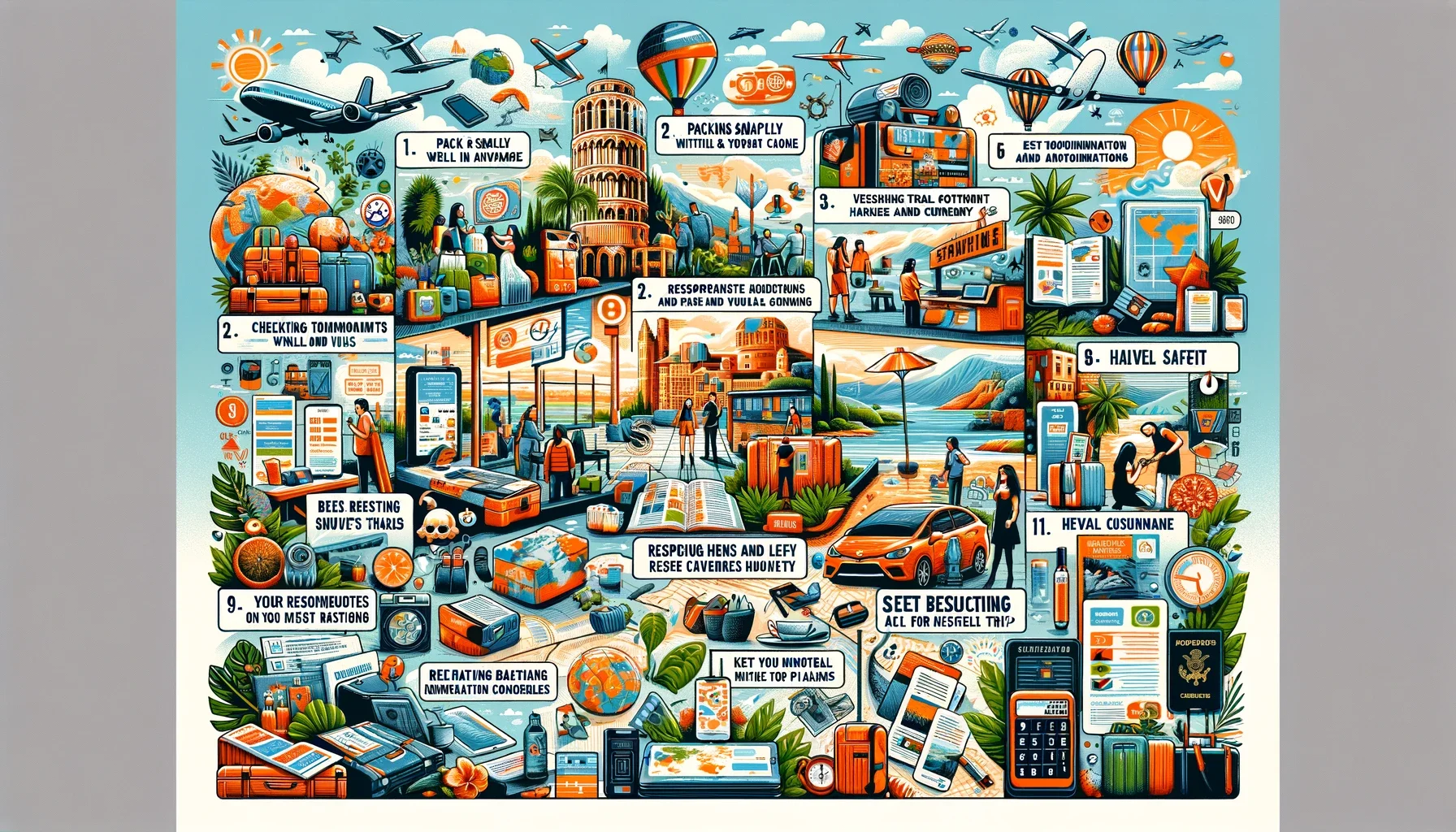Introduction to Travel Advice
Travel advice is a set of recommendations and tips designed to help people plan and enjoy their trips. It can cover a wide range of topics, including how to choose a destination, what to pack, how to stay safe, and how to deal with unexpected challenges.
Travel advice can be found in a variety of sources, including travel guides, websites, and blogs. It can also be provided by travel agents, tour operators, and other travel professionals.
Whether you are a seasoned traveler or a first-timer, travel advice can be a valuable resource. It can help you make the most of your trip and ensure that you have a safe and enjoyable experience.
One of the most important aspects of travel is planning. By taking the time to plan your trip, you can ensure that you have a smooth and enjoyable experience.
- Choose a destination that you are interested in and that fits your budget and interests.
- Do your research on the destination. Learn about the culture, climate, and attractions.
- Book your transportation and accommodation in advance.
- Get your passport and visa, if necessary.
- Start packing early. Make sure you have everything you need for your trip, including clothes, toiletries, and medication.
By following these tips, you can make the most of your trip and ensure that you have a safe and enjoyable experience.
Planning a trip can be a lot of fun, but it can also be a lot of work. To make the process easier, here are some tips for planning a successful trip:
- Set a budget. This will help you stay on track and avoid overspending.
- Choose a destination. There are so many amazing places to visit in the world, so take your time and choose a destination that you’re excited about.
- Do your research. Learn as much as you can about your destination before you go. This will help you make the most of your trip.
- Book your flights and accommodations. This is one of the most important steps in planning a trip, so make sure to book your flights and accommodations well in advance.
- Create an itinerary. This will help you stay organized and make the most of your time.
- Pack your bags. This is often the most stressful part of planning a trip, but it doesn’t have to be. Just make sure to pack everything you need and nothing you don’t.
Once you’ve taken care of all the planning details, you can sit back and relax and enjoy your trip.
Here are some additional tips for planning a successful trip:
- Be flexible. Things don’t always go according to plan, so be prepared to be flexible and adaptable.
- Don’t be afraid to ask for help. If you’re not sure about something, don’t hesitate to ask a local for help.
- Have fun! Traveling is a great way to experience new cultures and make new memories.
With a little planning, you can have a wonderful time on your next trip.
Tips forPacking for a Trip
Packing for a trip can be a daunting task, but it doesn’t have to be. By following a few simple tips, you can make sure that you have everything you need and that you’re not weighed down by unnecessary items.
Here are some tips for packing for a trip:
- Start by making a list of everything you need. This will help you to stay organized and avoid forgetting anything important.
- Consider the climate of your destination. If you’re traveling to a warm climate, you’ll need to pack light, airy clothing. If you’re traveling to a cold climate, you’ll need to pack warm clothes, such as sweaters, coats, and hats.
- Choose clothes that are versatile and can be mixed and matched. This will help you to create multiple outfits from a small number of items.
- Pack comfortable shoes. You’ll be doing a lot of walking when you’re on vacation, so make sure to pack shoes that are comfortable for you to wear.
- Don’t forget your toiletries. This includes items such as shampoo, conditioner, soap, toothpaste, and toothbrush.
- Pack a first-aid kit. This should include items such as bandages, antiseptic wipes, and pain relievers.
- If you’re traveling internationally, you may need to pack a few extra items, such as a passport, visa, and adapter plugs.
By following these tips, you can make sure that you’re prepared for your trip and that you have everything you need.
Here are some additional tips for packing for a trip:
- Roll your clothes instead of folding them. This will help to save space in your suitcase.
- Use packing cubes to organize your clothes. This will make it easier to find what you need.
- Pack light. You don’t want to be weighed down by unnecessary items.
- Don’t forget to pack your chargers. This includes chargers for your phone, laptop, and other electronic devices.
- If you’re traveling with children, pack extra snacks and activities. This will help to keep them entertained during the trip.
By following these tips, you can make sure that your packing experience is as smooth as possible.
Tips for Traveling on a Budget
Traveling on a budget is possible, but it does require some planning and effort. Here are a few tips to help you save money on your next trip:
- Do your research and find the best deals on flights, hotels, and other travel expenses.
- Consider traveling during the off-season or to less-popular destinations.
- Stay in hostels or guesthouses instead of hotels.
- Cook your own meals instead of eating out.
- Use public transportation or walk instead of taking taxis or Ubers.
Here are some additional tips for traveling on a budget:
- Sign up for travel rewards programs and use them to earn free flights, hotel stays, and other perks.
- Bring your own reusable water bottle and coffee cup to avoid paying for plastic bottles or cups.
- Pack light and avoid checking luggage, as this can save you money on baggage fees.
- Ask for discounts at attractions and restaurants. Many places offer discounts to students, seniors, and military members.
- Volunteer your time at a local organization while you’re traveling. This can be a great way to see the city and meet new people, and it can also save you money on activities.
By following these tips, you can save money on your next trip and still have a great time.
- Q: How much money do I need to travel on a budget?
- A: The amount of money you need to travel on a budget depends on your destination, the length of your trip, and your travel style. However, you can generally expect to save money by traveling during the off-season, staying in hostels or guesthouses, cooking your own meals, and using public transportation or walking instead of taking taxis or Ubers.
- Q: What are some ways to save money on flights?
- A: There are a few ways to save money on flights, including:
- Booking your flight in advance
- Considering flying on a budget airline
- Searching for flights on multiple websites
- Using a travel rewards program
- Q: What are some ways to save money on hotels?
- A: There are a few ways to save money on hotels, including:
- Booking your hotel in advance
- Considering staying in a hostel or guesthouse
- Using a travel rewards program
- Searching for hotels on multiple websites
Tips for Dealing with Jet Lag
Jet lag is a common problem for people who travel across time zones. It can cause a variety of symptoms, including fatigue, irritability, difficulty sleeping, and digestive problems. There are a number of things you can do to help minimize the effects of jet lag, including:
- Adjust your sleep schedule gradually.
If you are traveling east, start going to bed and waking up earlier a few days before your trip. If you are traveling west, start going to bed and waking up later a few days before your trip.
Stay hydrated.
Drink plenty of water to help your body stay hydrated and functioning properly.
- Eat healthy foods.
Eating healthy foods will help your body stay energized and healthy.
Get some exercise.
Exercise can help you stay awake and alert during the day.
- Avoid alcohol and caffeine.
Alcohol and caffeine can make jet lag worse.
Take melatonin.
Melatonin is a natural hormone that helps regulate sleep. Taking melatonin can help you adjust to your new sleep schedule.
- Use a white noise machine or earplugs.
A white noise machine or earplugs can help block out noise and create a more conducive environment for sleep.
Try relaxation techniques.
Relaxation techniques, such as yoga, meditation, or deep breathing, can help you relax and improve your sleep.
If you are experiencing severe jet lag, you may want to see a doctor. A doctor can prescribe medication to help you adjust to your new sleep schedule.
- What is jet lag?
- What are the symptoms of jet lag?
- How can I prevent jet lag?
- What can I do to relieve the symptoms of jet lag?
- What if I am experiencing severe jet lag?
Tips for Staying Safe While Traveling
Traveling can be a wonderful experience, but it can also be dangerous. Here are some tips to help you stay safe while traveling:
- Be aware of your surroundings.
Pay attention to where you are and who is around you. If you feel unsafe, move to a more populated area or ask for help.
- Don’t flash your valuables.
Keep your money, credit cards, and other valuables hidden away. Don’t wear flashy jewelry or carry around large amounts of cash.
- Be careful when using public transportation.
Be aware of your surroundings and keep your belongings close to you. Don’t fall asleep on public transportation.
- Don’t drink too much alcohol.
Drinking too much alcohol can impair your judgment and make you more vulnerable to crime.
- Use common sense.
Don’t go to unfamiliar places alone at night. If you’re lost, ask for help from a trusted local.
In addition to these general tips, there are also some specific safety tips for different types of travel:
- Traveling by air:
- Check in early for your flight.
- Keep your carry-on bag close to you at all times.
- Don’t leave your belongings unattended.
- Be aware of suspicious activity.
- Traveling by train:
- Secure your belongings in the overhead bin or under your seat.
- Don’t leave your belongings unattended.
- Be aware of suspicious activity.
- Traveling by bus:
- Secure your belongings in the overhead bin or under your seat.
- Don’t leave your belongings unattended.
- Be aware of suspicious activity.
- Traveling by car:
- Lock your car doors when you’re not in it.
- Don’t leave valuables in your car.
- Be aware of your surroundings and drive defensively.
- Traveling by boat:
- Wear a life jacket at all times.
- Be aware of the weather conditions and currents.
- Don’t go out on the water alone.
By following these tips, you can help reduce your risk of becoming a victim of crime while traveling.
Tips for Traveling with Children
Traveling with children can be a fun and rewarding experience, but it can also be challenging. Here are some tips to help you make your trip as smooth as possible:
- Plan ahead.
The more you plan ahead, the less stress you’ll have on your trip. Make sure you have all the necessary documents, such as passports and visas, well in advance. Also, research your destination and find out what activities and attractions are available for children.
Pack light.
Children get tired easily, so you don’t want to be weighed down by a lot of luggage. Pack only the essentials, and make sure your children can easily carry their own bags.
- Break up your trip into smaller segments.
Traveling long distances with children can be tiring, so consider breaking up your trip into shorter segments. This will give your children time to rest and explore their surroundings.
Stay flexible.
Things don’t always go according to plan when you’re traveling with children. Be prepared for delays, cancellations, and other unexpected events. If something goes wrong, don’t let it ruin your trip. Just roll with the punches and enjoy the moment.
- Be patient.
Children are unpredictable, and they may not always behave the way you want them to. Be patient with them and try to understand their point of view.
Have fun!
Traveling with children can be a lot of fun. Embrace the experience and make the most of it.
Here are some additional tips for traveling with children:
- Choose a destination that is child-friendly.
There are many destinations that are specifically designed for families with children. These destinations offer a variety of activities and attractions that are perfect for kids of all ages.
Book a hotel that is family-friendly.
Look for hotels that have amenities such as playgrounds, swimming pools, and kids’ clubs. These amenities can make your trip more enjoyable for everyone.
- Use a travel agent.
A travel agent can help you plan your trip and find the best deals on flights, hotels, and other travel arrangements. They can also help you with things like visas and passports.
Consider using a nanny or babysitter.
If you’re going to be traveling to a foreign country, you may want to consider hiring a nanny or babysitter to help you with your children. This can give you peace of mind knowing that your children are being taken care of while you’re away.
Traveling with children can be a great experience, but it’s important to be prepared. By following these tips, you can make your trip as smooth and enjoyable as possible.
Tips for Traveling with Pets
Traveling with pets can be a fun and rewarding experience, but it can also be a lot of work. There are a few things you can do to make your trip as smooth as possible.
First, you need to make sure your pet is properly vaccinated and up-to-date on its flea and tick medication. You should also bring a copy of your pet’s medical records with you on your trip.
Next, you need to find a pet-friendly place to stay. There are many hotels and motels that allow pets, but you should always call ahead to make sure they have availability. You may also want to consider staying in a pet-friendly Airbnb or VRBO.
When packing for your trip, be sure to include everything your pet will need, including food, water, toys, and a litter box. You may also want to bring a portable pet carrier or crate in case your pet needs to be confined during the trip.
When traveling by car, make sure your pet is properly secured in a pet carrier or crate. You should also stop frequently to let your pet stretch its legs and relieve itself.
If you are flying with your pet, you will need to check with the airline in advance to find out their pet policies. You will also need to purchase a pet carrier that meets the airline’s requirements.
Here are a few additional tips for traveling with pets:
- Start training your pet to travel early on.
- Make sure your pet is comfortable in its carrier or crate.
- Bring plenty of water for your pet to drink.
- Keep your pet on a leash when you are in public places.
- Be patient with your pet and give it plenty of time to adjust to its new surroundings.
With a little planning and preparation, you can make your trip with your pet a fun and enjoyable experience for both of you.
Tips for Traveling with Disabilities
Traveling with a disability can be challenging, but it is also possible to have a great trip. Here are some tips to help you plan your next trip:
-
- Do your research.
Before you book your trip, do some research to learn about the accessibility of your destination. This includes the availability of wheelchair-accessible transportation, accessible hotels and restaurants, and accessible attractions. You can find this information on the websites of the destination’s tourism board or on websites like Accessible Travel and Wheelchair Travel.
-
- Book accessible accommodations.
When booking your accommodations, make sure to specify that you need an accessible room. This will ensure that you have a room that is large enough for your wheelchair or other mobility device, and that has features like grab bars and accessible showers.
-
- Consider renting a wheelchair or scooter.
If you will be doing a lot of walking on your trip, you may want to consider renting a wheelchair or scooter. This can help you get around more easily and independently. You can find wheelchair and scooter rentals at many airports and tourist destinations.
-
- Plan your itinerary carefully.
When planning your itinerary, take into account the accessibility of the attractions you want to visit. This means making sure that there are accessible entrances, restrooms, and parking. You may also want to consider taking public transportation instead of driving, as this can be more difficult for people with disabilities.
-
- Ask for help when you need it.
Don’t be afraid to ask for help when you need it. This includes asking for assistance from staff at hotels, restaurants, and attractions. You can also ask other travelers for help, such as pushing your wheelchair or carrying your bags.
-
- Be patient.
Traveling with a disability can take longer than traveling without a disability. This is because you may need to take more time to get around, and you may need to wait for assistance from others. Be patient and don’t get frustrated if things don’t go according to plan.
-
- Enjoy your trip!
Despite the challenges, traveling with a disability can be a great experience. You can learn about new cultures, meet new people, and have adventures that you would never have had otherwise. So don’t let your disability hold you back from traveling the world.
Conclusion
Traveling with a disability can be challenging, but it is also possible to have a great trip. By following these tips, you can make your next trip more enjoyable and accessible.
Here are some additional resources that you may find helpful:




